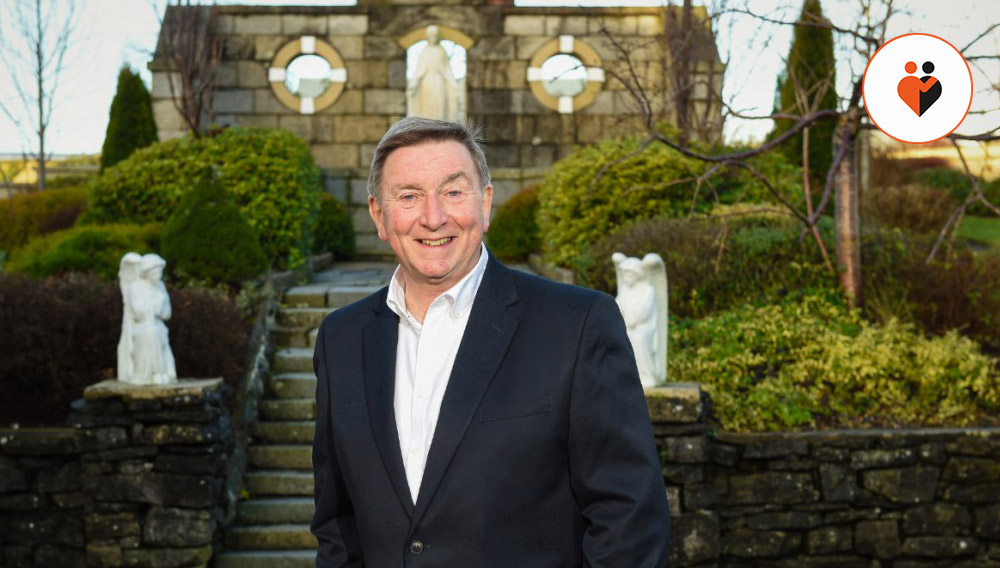
Father Brian D’Arcy: Compassion towards ourselves is the first step in helping others
Father Brian D’Arcy: Compassion towards ourselves is the first step in helping others
The subject of suicide is a tough one to talk about, write about or examine in any way. However, it’s important to be aware of the help that’s out there for anyone who has lost a loved one.
Barry McGale – a former clinician and therapist and an adviser to I Am Here – has years of experience on the subject of suicide postvention.
He has spent a lifetime helping people whose lives have been impacted by the loss of family members, friends and colleagues.
We recently spoke with Barry about his work with individuals struggling to pick up the pieces after a suicide, and how he works off a very simple model – ‘being there for people’.
“When people die from other circumstances, we tend to rally around their families. But what do we do when a death by suicide happens? Many of us back off.” he says.
He feels that the lack of social interaction and the loneliness that many of us are feeling as a result of the COVID-19 pandemic is something those who have lost a loved one to suicide can identify with.
Guilt and shame
If you have lost someone close to you, you may have gone through various levels of grief associated with a bereavement.
This can also be true for people who have seen loved ones take their own lives, although there are two core factors associated with suicide that you don’t always find with other deaths.
These are guilt and shame.
“In the past, these may have been commonly associated with HIV and AIDS but thankfully due to better understanding these are experienced less so,” Barry says.
“With suicide, the majority of people who came to see me when I was practising as a clinician experienced guilt and shame.
“Guilt is an internal thing. We my feel guilt due to our sense of responsibility for the death. And with a lot of people who are left behind after losing a loved one, the thing you’ll hear them say is ‘if only’ and ‘I would have…’ and ‘I should have…’ and ‘I could have…’
“That’s about our guilt. That’s our sense of responsibility.”
“What do others think of me?”
Shame is different, he adds.
“That’s external. Guilt is what we think of ourselves, shame is when we question what others “think of me?’
“Many who have lost someone to suicide are watching out for the reactions of others.
“One of the most common things I’ve heard people say is, ‘I was shopping and I saw someone who knows our family cross to the other side of the street’.
“And I’d always ask them, ‘why do you think that happened? Why do you think they were crossing the street?’ And they’d say something along the lines of, ‘they think I’m a bad mother because my son died’.
“I always encouraged them to talk openly about these things. They get to say these things. And once they’ve explored all aspects of this I ask them, ‘could there be any other reasons why they crossed the street?’
“And after they’ve had a chance to say their bit about being a bad mother, etc, they might answer, ‘oh well maybe they didn’t see me.’ It’s as simple as that.”
The jigsaw puzzle
In helping people who have lost a loved one to suicide to go through the process of grief, Barry uses the metaphor of a jigsaw puzzle.
Getting people to the point where they can accept that they can never truly know why a person may have taken their own life is the reason for this.
“The person who has died has left you all your own individual jigsaw puzzle,” he says.
“This puzzle that’s been left has no picture, we have no box to look at, we just have all these broken pieces that are there.
“Most of us find the edges and the corners and we work our way in. We’re working on the extremities first and we’re trying to get to the core of why this happened.
“Everyone has their own jigsaw puzzle because everyone had their own different relationship with the person, and we’re all starting to put it together.
“Sometimes you’re trying to make the pieces fit in, and that’s the same thing with a death by suicide. People are convinced, ‘that’s the answer!’ At that point, the jigsaw piece won’t fit in the puzzle and things start to buckle.
“They carry on ultimately and get to the end and there’s one piece of the puzzle missing. Everybody has one piece missing, and that’s because the deceased took that piece with them.
“It’s gone. They hold that final piece and, in other words, you can never complete the jigsaw puzzle. However, the importance is the process of trying to complete it.
“It’s about continually trying to get to see that the final piece will never be there. That process, if people are helped along, can help people to understand that they will never know the ‘why’.”
An environment that we can all help to create
At I Am Here, we create and cultivate an environment where we watch out for others and it becomes acceptable to talk about how we are feeling.
It’s important to Show you care, Ask the question and ultimately, Call for help when we see a friend or a fellow Team Member going through a hard time.
Putting people’s mental health and wellbeing ahead of everything else, we believe, is key to a world where more and more people will recognise the options that are there, even in the toughest times.
“When people’s mood changes and some of their problems seem insurmountable, what happens is blinkers start to appear,” says Barry.
“All they see is the negative stuff. They can’t see anything but darkness, and they can’t see the resources – internal or external – that can help and support them.
“Therefore, they may only see one way out, which can be suicide.
“As a friend, as a family member or a fellow Team Member, any of us just being there can actually let a bit of light in. That, in itself, can be enough to bring someone back slightly.”
Creating an environment where the I Am Here CLEAR skills of Compassion, Listening, Empathy, Acceptance and being Real with one another are used on a daily basis is crucial.
“There’s only one person who can stop someone from taking their lives – that’s the person himself or herself,” adds Barry.
“The rest of us can create an environment where those people make a decision not to take their lives.”
